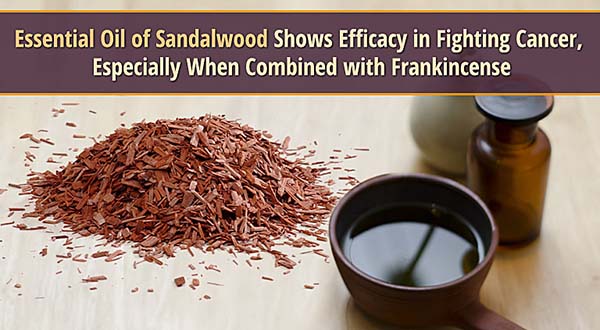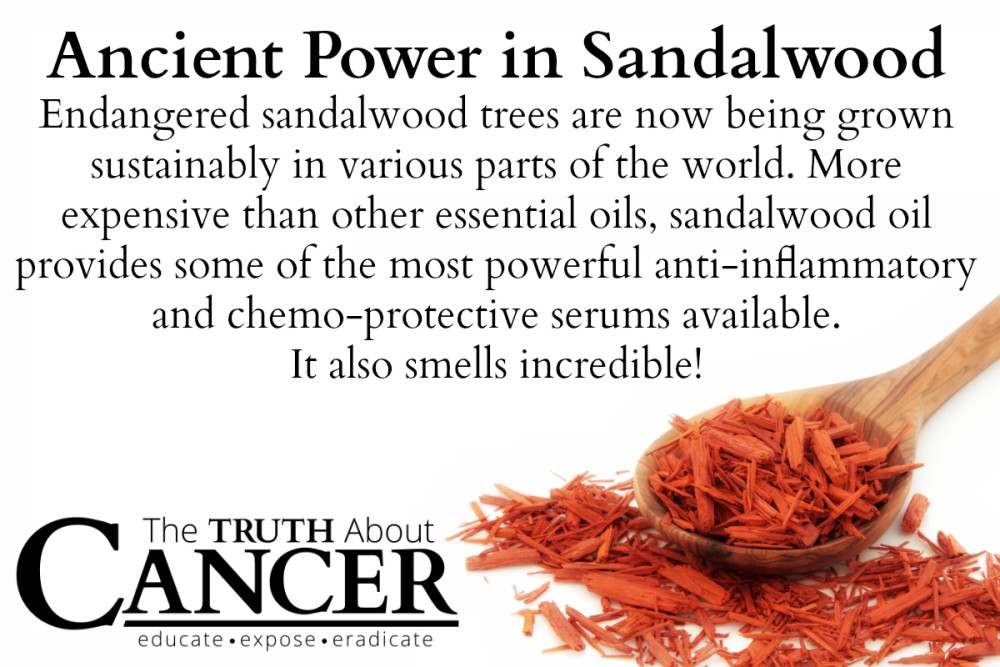Imagine yourself journeying across Southeast Asia and encountering giant trees giving off a fragrant, earthy aroma marked by a tinge of sweetness and a hint of fruit. A local expert in Ayurvedic medicine informs you that deep within the heartwood of these trees is a precious substance that has been used by traditional healers for centuries to fend off debilitating disease.
The trees being described here are known as sandalwood, and they really are one of nature’s perfect miracles when it comes to healing. From a cancer perspective, the essential oil of sandalwood, which is tapped from the centermost area of sandalwood tree trunks and roots, is a time-tested remedy for preventing tumors and their associated cancers.
Though technically endangered, sandalwood trees are now being grown sustainably in various parts of the world, including in Australia and Indonesia. While generally more expensive than many other essential oils, sandalwood oil remains among the most powerful anti-inflammatory and chemo-protective serums available – and it smells incredible!
A 1997 study published in the European Journal of Cancer Prevention made some interesting observations about sandalwood’s chemo-protective effects, particularly with regards to skin cancer. Rich in sesquiterpenes, sandalwood has long been used by traditional herbalists to make healing skin pastes, and it appears as though one of the uses may have been in the treatment of skin papillomas.
Based on the study’s findings, which showed that sandalwood oil decreased papilloma frequency by 67 percent, the authors concluded that it may be an effective way to protect against skin cancer.
Sandalwood Coupled with Frankincense Shows Amazing Potential in Targeting Bladder Cancer
A more recent paper published in the journal Chinese Medicine further identified sandalwood’s anti-cancer potential alongside that of a related oil, frankincense. Operating in coordinated but distinct ways, these two precious oils were observed to both promote cancer cell death and inhibit cancer cell potency.
The latter effect is where sandalwood oil really got to show off its power, halting the viability of two particular cells implicated in human bladder cancers: J82 and UROtsa. Like frankincense oil, sandalwood was shown to activate certain signaling pathways in order to fight against these cells, but its mode of achieving this was found to be distinct from its partnered oil.
“Heat shock proteins and histone core proteins were activated by frankincense essential oil, whereas negative regulation of protein kinase activity and G protein-coupled receptors were activated by sandalwood essential oil treatment,” the authors wrote.
“While frankincense essential oil elicited selective cancer cell death via NRF-2-mediated oxidative stress, sandalwood essential oil induced non-selective cell death via DNA damage and cell cycle arrest.”
For their research, scientists used volume-to-volume oil ratios of 1,400-600 dilution for frankincense and 16,000-7,000 dilution for sandalwood. Be sure to consult with a qualified physician before attempting to treat any form of cancer using essential oils.




















Question 1, recommedations for other oils, and 2.DO YOU SUGGEST SURGERY FIRST: REMOVE CANCER, THEN FIGHT WITH ALT MEDS????
I have invasive breast cancer re run, same place as before, one tumor over 1cm big, for sure after biopsy, one developing and a couple nodes looking deadly. It was hormone driven last time. Last time removed, lumpectomy, but refused radiation and tomoxafin. Metastatic work up is not showing cancer anywhere else. I’ve started on CBD (hempworx) and I’m going to start on full spectrum, 1:1 cbd/thc. I’m taking vit C, emergenC type, moringa powder, Ningxia Red(Young Living Gogi berry drink plus) B17 capsules 1 per day is recommended.. I’m going to get more Frank carterii, and I have other oils including a small amount of sandalwood. ..recommendations for doses? other oils? how to use? consumption?
DO YOU SUGGEST SURGERY FIRST: REMOVE CANCER, THEN FIGHT WITH ALT MEDS????
Hi E Breen,
We cannot provide specific medical advice. The best advice we can give you is to consult with one of the doctors/experts that we interviewed in our Global Quest Series. Here is a link to get their information: https://thetruthaboutcancer.com/experts-info-sheet/
How much of each essential oils were used? How were they administered?